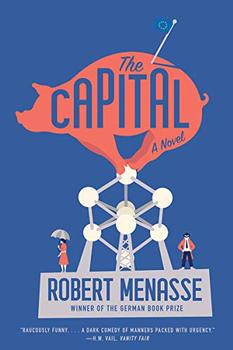Summary | Excerpt | Reviews | Beyond the book | Read-Alikes | Genres & Themes | Author Bio

In The Senility of Vladimir P., neither near absolute power nor infinite wealth saves Vladimir Putin from the scourge of modern life: dementia. Set twenty years in the future in the once-all-powerful oligarch's ninth decade, the story is a dark tale of Alzheimer's disease, where any decent humanity comes, not from a titan whose neural networks are collapsing, but rather from Sheremetev, a private nurse and the lone person caring for Vladimir P. while he's secreted in his palatial dacha outside Moscow. Sheremetev is a small, quiet man; a person compressed into anonymity, and yet conscientious and empathetic; a nurturer to the wounded bear that was once Vladimir Putin. And so is the foundation of this novel: a man turned political allegory edged by Orwellian surrealism.
Minor characters flesh out the ensemble cast at Vladimir's dacha, the most intriguing being Stepanin, a world-class chef buoyed by his belief that the demented former president understands and appreciates the gourmet meals he prepares. His interactions with Sheremetev, as the nurse gradually grows aware of the extent of corruption at the dacha, are threaded with black comedy. However, it is through the portrait of Vladimir P., an imperial psychopath once so strong, that the narrative shimmers with his gravitas, even while he's lost within Alzheimer's thickets. Honig's Vladimir interrupts Sheremetev's narrative at will. Vladimir, with black eyes blank, sees, instructs, and harangues comrades both alive and long dead, often exploding into incoherent rages. Yet, at other times, he is led about like a toddler, spoon-fed, regularly whimpering in fear of an ever-present decapitated head, that of a Chechen terrorist, who he sees "grinning yellow teeth, the tongue emerging from the mouth ... swollen and black, like a gigantic slug."
Although some exposition arrives in an arch, almost Victorian voice, the politics-power-corruption plotline is simple. Vladimir P.'s immense fortune, loot from multiple stints as Russia's supreme leader, provides all he needs and enough more to succor every employee or hanger-on through embezzlement or outright theft. Sheremetev has little family left. His politically active nephew faces the gulag unless a bribe of $300,000 is paid. It's a situation further complicated because his brother gave Sheremetev all the money he could gather, including his retirement funds, when Sheremetev's wife was dying of cancer.
The interaction between the brothers arrives on the page with reportorial accuracy, with Sheremetev's sister-in-law voicing the fears of the truly terrorized, all driven by a steady undercurrent of unmitigated fraternal love. Left unlocked in Vladimir P.'s suite is a cabinet with several dozen prestige wristwatches, any one of which might pay the nephew's bribe. Loyalty trumps ethics, and in this hostile territory Sheremetev steals and is stolen from, trapped by thuggery and the ugly participation of his own son, a young man who has coped with corruption by becoming a fixer.
Honig's work is an intriguing personal story, with Sheremetev, a Mr. Everyman protagonist, kind, empathetic, and yet often wearily disaffected. It is political satire too, not overly subtle, inflicting razor-sharp cuts on the corrupt and corrupting aspects of the unfettered crony capitalism that raped Russia post-Yeltsin.
![]() This review was originally published in The BookBrowse Review in August 2016, and has been updated for the
August 2017 edition.
Click here to go to this issue.
This review was originally published in The BookBrowse Review in August 2016, and has been updated for the
August 2017 edition.
Click here to go to this issue.

If you liked The Senility of Vladimir P., try these:

by Robert Menasse
Published 2020
Winner of the German Book Prize, The Capital is an "omniscient, almost Balzac-ian" (Steven Erlanger, New York Times) panorama of splintered Europe.

by Keith Gessen
Published 2019
A literary triumph about Russia, family, love, and loyalty—the first novel in ten years from a founding editor of n+1 and author of All the Sad Young Literary Men
Your guide toexceptional books
BookBrowse seeks out and recommends the best in contemporary fiction and nonfiction—books that not only engage and entertain but also deepen our understanding of ourselves and the world around us.